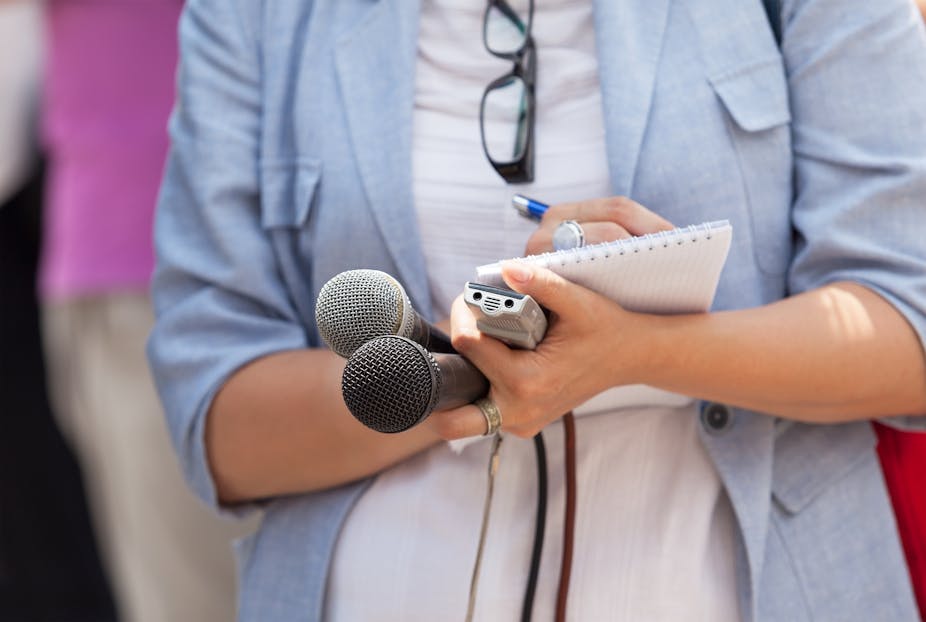South Australia recently became the second-to-last state to pass shield laws that purport to help journalists avoid naming their confidential sources.
What is the effect of this new law? Is it all that it is cut out to be? To answer this question, we need to look briefly at recent legal history.
Lawyers and doctors (and priests, for that matter, although this is now a matter of some contention) have for centuries enjoyed a legal privilege regarding their professional confidences. But the confidences of journalists have never been guaranteed. So a journalist who refuses to answer a question in a courtroom on the grounds of protecting a source can be found guilty of contempt and may be punished, even imprisoned, unless a “shield” in some form can be held up.
Read more: How surveillance is wrecking journalist-source confidentiality
One can see a conundrum immediately. On the one hand, the journalists’ code of ethics requires them to keep their sources confidential. The Media, Entertainment and Arts Alliance, the trade union for the industry, requires that:
…in all circumstances (journalists) shall respect all confidences received in the course of their calling.
On the other hand, it is arguable that it would be intolerable to allow journalists to place their ethics above the law.
In a well-known 1963 case in Britain, two journalists from the political weekly The New Statesman were jailed for refusing to name the source of information that exposed security leaks in the office of the Admiralty. As the court opined in the case:
How is anyone to know that this story was not a pure invention, if the journalist will not tell the tribunal its source?
Australian prison cells have been home to their fair share of journalists, too. In 1989, The Australian’s Tony Barrass spent a week behind bars in WA. In 1992, the Courier-Mail’s Joe Budd was jailed for a week in Queensland. In 1993, the ABC’s Chris Nicholls spent three months in prison in South Australia for refusing to answer questions put to him about his information source.
Journalists provided with a shield
The “shield laws” that have been enacted in Australia in recent years have been touted as an appropriate path through this intractable legal minefield.
In 2011, Attorney-General Robert McClelland successfully guided into law amendments to the Commonwealth Evidence Act. It now says that if a journalist has promised not to disclose an informant’s identity, neither the journalist, nor his or her employer, can be compelled to do so in a federal court – unless there are strong reasons of public interest.
Read more: Protecting the journalists' privilege: reporters go to court
Four state and territory governments quickly followed suit with their own shield laws. South Australia is now the latest. This is not surprising, given that the new Liberal government had promised to follow through on MLC Andrew McLachlan’s draft shield bill that had been rejected by the Labor government in 2015.
South Australia’s shield law mandates that for sources to be named in court, there must be a specific application to reveal them. But there is an exception: inquisitorial bodies such as the Independent Commission Against Corruption (ICAC) and the South Australia Ombudsman have the power to decide if a journalist should be compelled to reveal a source without an application being made.
Loopholes and inconsistent interpretations
Despite all the lofty sentiments, shield laws have a significant hole. The new SA law has a similar provision to the Commonwealth law and other state laws that came before it: a court can order a journalist to disclose the identity of an informant if the public interest outweighs any likely adverse consequences for the source.
So what the left hand gives to the journalist, the right hand takes away.
Indeed, if you thought the parliament had finally got the balance right and made the requirements of the law fair to investigative journalists, a quick look at the eight-year history of the Helena Liu v The Age litigation would cause you to think again.
The trial judge in that case determined that the “shield” could be lifted because The Age’s informant did not face harm by being identified. However, the order to reveal the source was later “stayed”. That order was then reversed on appeal.
This simply illustrates that interpretations of the legislative requirements may differ from case to case and judge to judge.
Read more: Five reasons terror laws wreck media freedom and democracy
Indeed, the new shield laws across Australia do not add that much to the old common law that gave a judge discretion to allow a journalist to protect his or her source if the interests of “justice” demanded it.
For example, the Victorian shield laws did protect a journalist from The Age who successfully argued that his source would be under threat from the mafia if he was forced to name him. But a judge could quite easily have made the same order under the old law.
In the final analysis, it is worth looking at the oft-forgotten “shield” provisions of the Commonwealth Privacy Act. Under that act, a journalist can be fined or imprisoned for failing to provide information, answer a question or produce a document unless he or she testifies that doing so would reveal the name of a source who had supplied the information confidentially. No ifs, no buts.
Now that’s the sort of shield laws that investigative journalists want and need, not the Swiss-cheese variety now on offer around the country.

